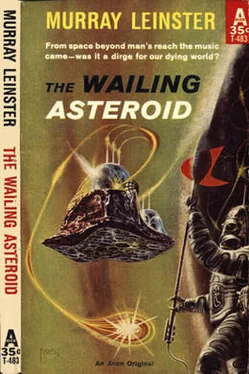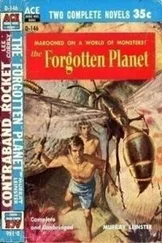Houses looked fine–drawn, now, and Pam was fidgety. Keller appeared to be wholly normal. And Sandy was conspicuously calm.
"I'll be glad when this is over," she said at dinner in the ship in the lock–tunnel. "I don't think any of you realize what this fortress and the matter–transposer and the planet it took us to—I don't believe any of you realize what such things can mean to people."
Burke waited. She smiled at him and said briskly, "There's a vacant planet for people to move to. People occupied it once. They can do it again. Once it had a terrific civilization. This fortress was just one of its outposts. There were plenty of other forts and other planets, and the people had sciences away ahead of ours. And all those worlds, tamed and ready, are waiting right now for us to come and use them."
Holmes said, "Yes? What happened to the people who lived on them?"
"If you ask me," said Sandy confidentially, "I think they went the way of Greece and Rome. I think they got so civilized that they got soft. They built forts instead of fighting fleets. They stopped thinking of conquests and begrudged even thinking of defenses, though they had to, after a fashion. But they thought of things like the Rhine forts of the Romans, and Hadrian's Wall. Like the Great Wall of China, and the Maginot Line in France. When men build forts and don't build fighting fleets, they're on the way down."
Burke said nothing. Holmes waited for more.
"It's my belief," said Sandy, "that many, many centuries ago the people who built this fort sent a spaceship off somewhere with a matter–transposer on board. They replaced its crew while it traveled on and on, and they gave it supplies, and refreshed its air, and finally it arrived somewhere at the other side of the Galaxy. And then the people here set up a matter–transposer and they all moved through it to the new, peaceful, lovely world they'd found. All except the garrison that was left behind. The Enemy would never find them there! And I think they smashed the matter–transposer that might have let the Enemy follow them—or the garrison of this fort, for that matter! And I think that away beyond the Milky Way there are the descendents of those people. They're soft, and pretty, and useless, and they've likely let their knowledge die, and there probably aren't very many of them left. And I think it's good riddance!"
Pam said, "If we beat the Enemy there'll be no excuse for wars on Earth. There'll be worlds enough to take all the surplus population anybody can imagine. There'll be riches for everybody. Joe, what do you think the human race will do for you if, on top of finding new worlds for everybody, you cap it by defeating the Enemy with the globes?"
"I think," said Burke, "that most people will dislike me very much. I'll be in the history books, but I'll be in small print. People who can realize they're obligated will resent it, and those who can't will think I got famous in a disreputable fashion. In fact, if we go back to Earth, I'll probably have to fight to keep from going bankrupt. If I manage to get enough money for a living, it'll be by having somebody ghost–write a book for me about our journey here."
Keller interrupted mildly, "It's nearly time. We should watch."
Holmes stood up jerkily. Pam and Sandy rose almost reluctantly.
They went out of the ship and through the metal door with rounded corners. They went along the long corridor with the seeming river of light–tubes in its ceiling. They passed the doorway of the great room which had held the globes. It looked singularly empty, now.
On the next level they passed the mess–halls and bunk–rooms, and on the third the batteries of grisly weapons which could hurl enormous charges of electricity at a chosen target, if the target could be ranged. They went on up into the instrument–room by the final flight of stairs.
They settled down there. That is, they did not leave. But far too much depended on the next hour or less for anybody to be truly still in either mind or body. Holmes paced jerkily back and forth, his eyes on the vision–screens that now relayed what the observer–globes with the globe–fleet saw.
For a long time they gazed at the emptiness of deepest space. The picture was of an all–encompassing wall of tiny flecks of light. They did not move. They did not change. They did not waver. The observer–globes reported from nothingness, and they reported nothing.
Except one item. There were fewer red specks of light and more blue ones. There were some which were distinctly violet. The globes had attained a velocity so close to the speed of light that no available added power could have pushed them the last fraction of one per cent faster. But they had no monstrous mass–fields to change the constants of space and let them travel more swiftly. The Enemy ships did. But there was no sign of them. There could be none except on such a detector as the instrument–room had in its ten–foot transparent disk.
Time passed, and passed. And passed. Finally, Burke broke the silence.
"Of course the globes don't have to make direct hits. We hope! If they multiply the gravity–field that hits them and shoot it back hard enough, it ought to burn out the gravity–generators in the ships."
There was no answer. Pam watched the screens and bit nervously at her nails.
Seconds went by. Minutes. Tens of minutes….
"I fear," said Keller with some difficulty, "that something is wrong. Perhaps I erred in adjusting the globes—"
If he had made a mistake, of course, the globe–fleet would be useless. It wouldn't stop the Enemy. It wouldn't do anything, and in a very short time the sun and all its planets would erupt with insensate violence, and all the solar system would shatter itself to burning bits—and the Enemy fleet would be speeding away faster than exploding matter could possibly follow it.
Then, without warning, a tiny bluish line streaked across one of the screens. A second. A third–fourth–fifth–twentieth–fiftieth—The screens came alive with flashing streaks of blue–green light.
Then something blew. A sphere of violet light appeared on one of the screens. Instantly, it was followed by others with such rapidity that it was impossible to tell which followed which. But there were ten of them.
The silence in the instrument–room was absolute. Burke tried vainly to imagine what had actually happened. The Enemy fleet had been traveling at thirty times the speed of light, which was only possible because of its artificial mass which changed the properties of space to permit it. And then the generators and maintainers of that artificial mass blew out. The ships stopped—so suddenly, so instantly, so absolutely that a millionth part of a second would have been a thousand times longer than the needed interval.
The energy of that enormous speed had to be dissipated. The ships exploded as nothing had ever exploded before. Even a super–nova would not detonate with such violence. The substance of the Enemy ships destroyed itself not merely by degenerating to raw atoms, but by the atoms destroying themselves. And not merely did the atoms fly apart, but the neutrons and protons and electrons of which they were composed ceased to exist. Nothing was left but pure energy—violet light. And it vanished.
Then there was nothing at all. What was left of the globe–fleet went hurtling uselessly onward through space. It would go on and on and on. It would reach the edge of the galaxy and go on, and perhaps in thousands of millions of years some one or two or a dozen of the surviving spheres might penetrate some star–cloud millions of millions of light–years away.
In a pleased voice, Keller said, "I think everything is all right now."
And Sandy went all to pieces. She clung to Burke, weeping uncontrollably, holding herself close to him while she sobbed.
Читать дальше







